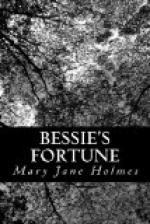“If there’s anything I dote on particularly, it’s on ancestry halls,” Mrs. Rossiter-Browne said, as she looked admiringly around her. “Now them chairs, which a Yankee would hide in the garret, speak of a past and tell you’ve been somebody a good while. I’d give the world for such an old place as this at home; but, my land! we are that new in America that the starch fairly rattles as we walk. We are only a hundred years old, you know; had our centennial two or three years ago. That was a big show, I tell you; most as good as Europe, and better in some respects, for I could be wheeled in a chair and see things comfortable, while over here, my land! my legs is most broke off, and I tell Gusty I’ll have to get a new pair if I stay much longer. Think of me climbing up Pisa, and St. Peter’s, and all the Campyniles in the country, and that brass thing in Munich to boot, where I thought I should of sweltered, and all to say you’ve been there. It’s a park of nonsense, I tell ’em, though I s’pose it does cultivate you, and that reconciles me to it.”
Here the lady paused for breath, and Augusta, whose face was very red, began to talk to Bessie of Wales and the wild, beautiful scenery. She was as well educated as most young ladies of her class, and was really a very pretty, lady-like girl, who expressed herself well and intelligently, and was evidently annoyed by her mother’s manner of speaking, for she tried to keep the conversation in her own hands, and Bessie, who guessed her design, helped her to do so; and after a few moments Mrs. Browne arose to go, and, shaking out her silk flounces and pulling her hands to her ears to make sure her immense diamonds were not unclasped, because, as she said, she would not for a farm lose her solitarys, she said good-morning, and was driven away to see the elephant of Bangor and vicinity.
Bessie drew a long breath of relief as she saw the carriage leave the park, and said: “Oh, mother, how can you find pleasure in her society, and are the Americans generally like her?”
“Not half as good as she, some of them, though vastly more refined and better educated,” Daisy replied, warming up in defense of the woman who was so kind to her, and whom she knew to be honest and true as steel. “There are plenty of ignorant, vulgar women in England, traveling on their money recently acquired, who at heart are not half as good as Mrs. Browne,” she said; “and for that matter there are titled ladies too who know precious little more than she. Why, old Lady Oakley once sent me a note, in which more than half the words were misspelled, and her capitals were everywhere except in the right place; but she is my lady, and so it is all right. I tell you Bessie, there is, after all, but little difference between the English and the Americans, who, as a class, are better informed than we are and know ten times more about our country than we do about theirs.”
Daisy grew very eloquent and earnest as she talked, but Bessie was not convinced, and felt a shrinking from Mrs. Rossiter-Browne as from something positively bad; and here she did the woman great injustice, for never was there a kinder, truer heart than Mrs. Browne’s, and if, in her girlhood, she had possessed a tithe of her present fortune, she would have made a far different woman from what she was.




